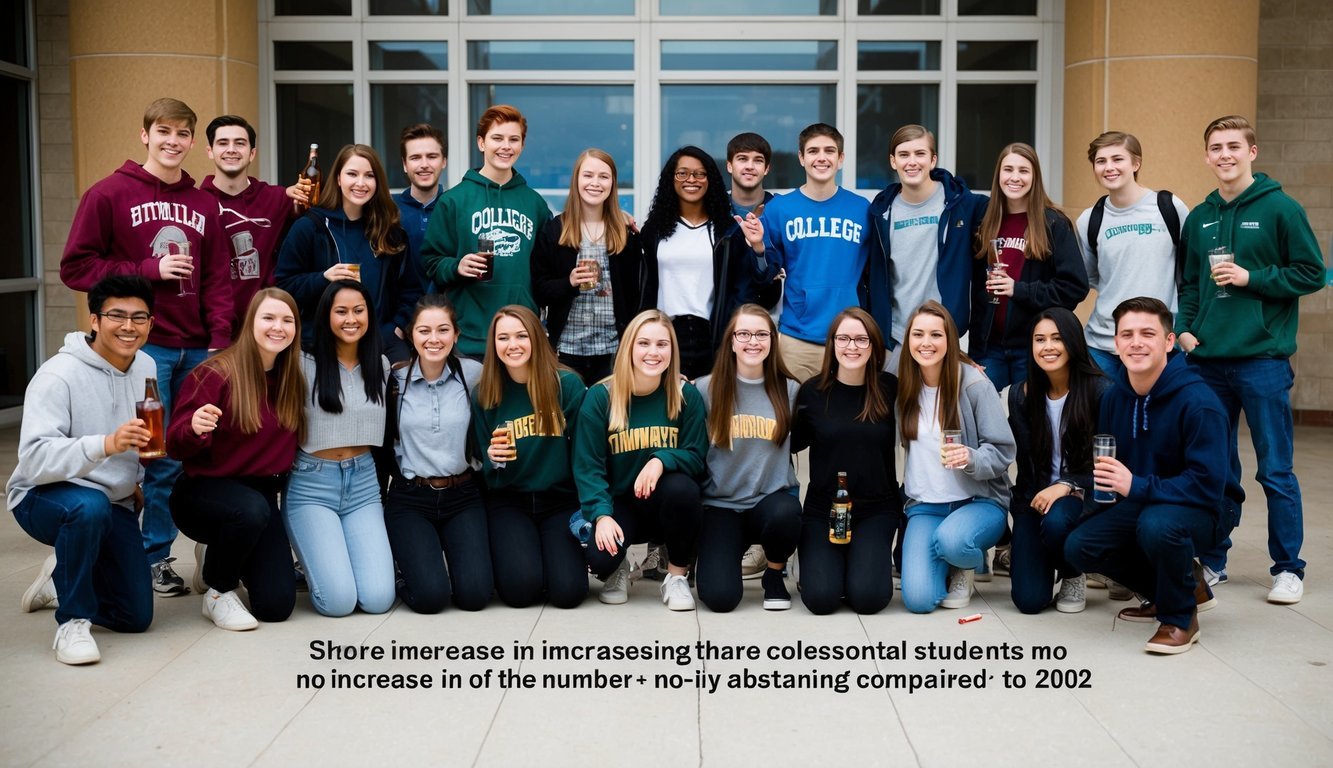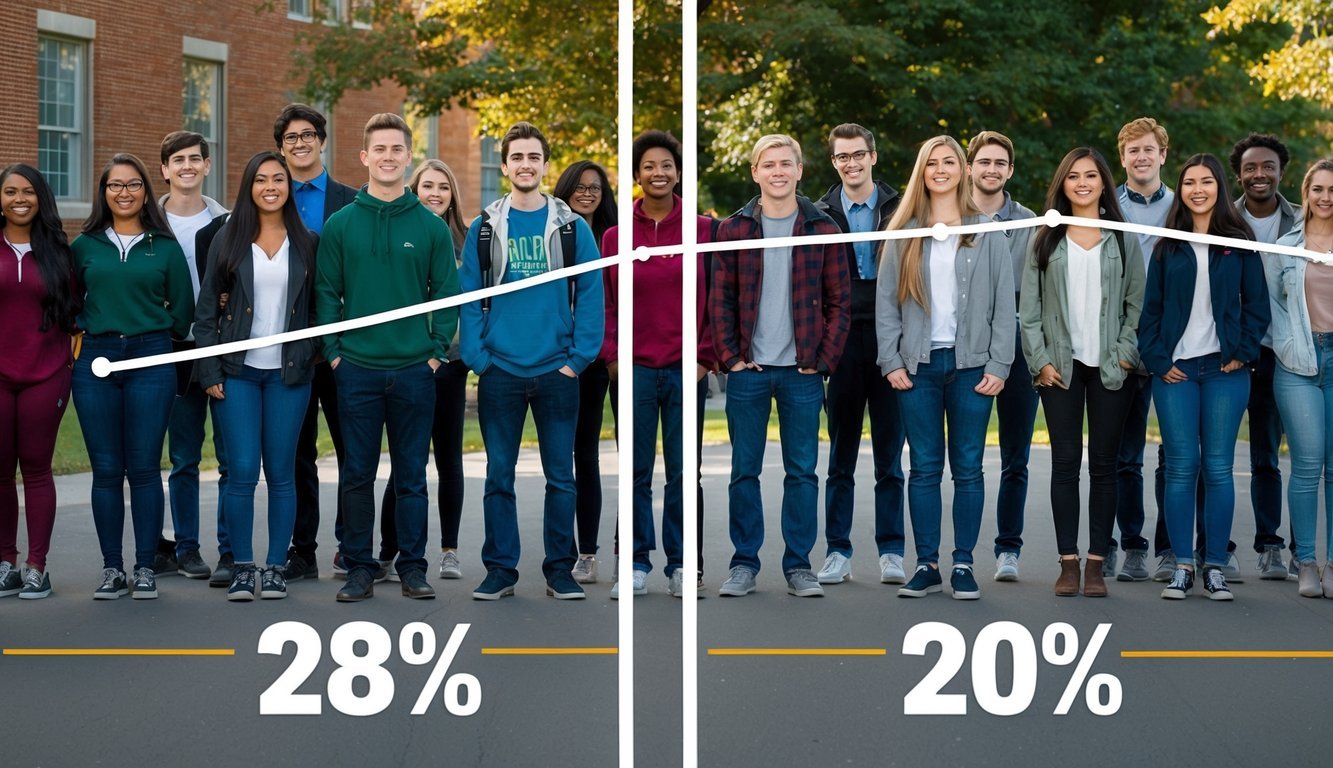PsychNewsDaily Publishers
100 Summit Drive
Burlington, MA, 01803
Telephone: (320) 349-2484
PsychNewsDaily Publishers
100 Summit Drive
Burlington, MA, 01803
Telephone: (320) 349-2484
Recent studies indicate a significant increase in college students abstaining from alcohol, driven by heightened health awareness, changing social norms, and a focus on mental well-being.

Recent studies show a shift in how college students view alcohol. In 2002, only 20% of college students reported not drinking alcohol. Fast forward to 2018, and that number rose to 28%. This increase over the years highlights a changing trend in drinking habits among young adults.
Organizations like the National Institute on Alcohol Abuse and Alcoholism have noted these changes in behavior, reflecting a broader cultural shift. Many students are choosing healthier lifestyles, affected by the growing awareness of the risks associated with alcohol consumption. The American Medical Association also supports these findings, emphasizing the importance of education around alcohol use.
Factors contributing to this trend include a rising focus on mental health, academic pressures, and a desire for clearer personal goals. As colleges adapt to these preferences, it’s essential to understand what influences this new wave of sober-minded students.

Recent studies show a notable increase in the number of college students who choose to abstain from alcohol. From 2002 to 2018, this figure grew from 20% to 28%. Various factors influence this shift, including changing social norms and increased awareness of alcohol-related issues.
The trend in alcohol abstinence among college students is significant. In 2002, only 20% of college students reported not drinking alcohol. Fast forward to 2018, and that number rose to 28%.
This change reflects a growing awareness of the dangers associated with alcohol use, including alcoholism and binge drinking. Many young adults now recognize that avoiding alcohol can lead to healthier lifestyles.
Statistics indicate that colleges are also responding to these trends. Many institutions have enhanced their alcohol education programs, aiming to inform students about the risks of drinking.
Several reasons contribute to the increase in alcohol abstinence among college students. First, social norms are changing. With friends and peers increasingly choosing not to drink, many students feel more comfortable staying sober.
Another factor is the rising awareness of the negative effects of alcohol on health. Many students now understand the risks associated with heavy drinking and aim to avoid them.
Additionally, social media plays a role. Platforms showcase the benefits of sobriety, promoting healthier choices among young people. They can connect with others who value a sober lifestyle, reinforcing these positive changes.

The choice to abstain from alcohol can lead to significant health benefits and better academic performance for college students. Understanding these impacts helps highlight the importance of reducing alcohol consumption.
Abstaining from alcohol can greatly improve physical and mental health. Young adults who do not drink are less likely to face alcohol-related problems, such as addiction and liver damage. Lower alcohol use also reduces the risk of injuries and accidents, which are common among those who drink excessively.
Research shows that those who abstain may experience better sleep patterns and improved emotional well-being. They may also have higher energy levels, allowing for a more active lifestyle. This healthier lifestyle can include regular exercise and better eating habits, contributing to overall wellness.
Moreover, avoiding alcohol can lead to better decision-making skills. This is important in avoiding risky behaviors commonly associated with underage drinking.
Alcohol can negatively impact academic success. Studies show that college students who abstain tend to have higher grades. For example, those who do not engage in excessive drinking often have better focus and time management skills.
When students avoid alcohol, they can dedicate more time to studying and participating in campus activities. They might also be more engaged in classroom discussions and group projects. This commitment can lead to stronger relationships with peers and professors.
Furthermore, reducing alcohol use helps students maintain a positive reputation on campus. They are less likely to be involved in incidents that can tarnish their academic record, such as disciplinary action related to drinking. Overall, lower alcohol consumption supports a more successful college experience.

Colleges are taking steps to address the rise in abstinence from alcohol among students. They are creating policies and programs aimed at promoting healthier choices. In addition, medical and counseling interventions play an important role in supporting students.
Many universities have implemented strict policies to reduce high-risk drinking. This includes limiting alcohol on campus and banning drinking at certain events. Schools often organize educational programs to inform students about the risks of alcohol use.
Interactive workshops teach students how to handle peer pressure. Programs highlight alternatives to drinking, such as social events without alcohol. Colleges are also promoting responsible drinking among those who choose to drink, focusing on moderation.
Moreover, orientation sessions now often include discussions about alcohol use. Schools aim to create a supportive environment where students feel comfortable making healthy choices.
Counseling services play a vital role in helping students with alcohol use disorder. Many campuses offer confidential counseling for those struggling with their relationship with alcohol.
Medical professionals can assess students’ drinking habits and identify those at risk. They provide customized interventions that may include therapy, support groups, and educational resources.
Counselors often incorporate motivational interviewing techniques. This approach encourages students to reflect on their choices and consider making changes. Access to mental health services is essential in addressing issues related to high-risk drinking.

The shift in alcohol consumption among college students reveals insights into changing societal norms. Understanding these changes helps predict future drinking patterns among young adults.
In recent years, the drinking culture among young adults has seen significant change. A study published in JAMA highlighted that college students who abstained from alcohol increased from 20% in 2002 to 28% in 2018.
Factors contributing to this shift include:
Platforms like Yahoo have also reported on this trend, noting that many young adults prefer socializing without alcohol. This change may reflect broader societal values, promoting informed choices about health and wellness.
As drinking habits evolve, predictions suggest that the trend of abstention will continue. Experts anticipate that younger generations may further embrace sober living.
Key indicators of future trends include:
With these influences, it’s likely that college students will adopt healthier habits around alcohol. By engaging with these changing perspectives, society can foster an environment that supports responsible drinking choices among young adults.

Alcohol consumption among college students has changed significantly from 2002 to now. Many factors contribute to this decline, including shifts in social behaviors and attitudes, which will be explored in the following subsections.
Several factors may influence the decrease in alcohol consumption among college students. Increased awareness of health risks related to drinking plays a big role. Additionally, many young adults are prioritizing mental health and self-care.
Generation Z tends to drink less than millennials did at the same age. Studies show that younger adults are more cautious about alcohol and its effects, which may be influenced by their experiences during the pandemic.
As Gen Z drinks less, nightclubs and bars may need to adapt their business strategies. Establishments might focus on offering non-alcoholic beverages or creating environments that appeal to those who prefer socializing without alcohol.
Recent studies highlight a notable trend of rising abstinence among young adults. Reports indicate that about 28% of college students now choose to abstain from drinking, compared to only 20% in 2002.
The alcohol industry is changing its marketing strategies to reach a younger audience. Companies are promoting low-alcohol or non-alcoholic options, catering to the preferences of consumers who are more health-conscious.
Gen Z is embracing various lifestyle choices that reflect a shift in social norms. Activities such as fitness, wellness events, and sober parties are becoming more popular. These activities highlight the importance of health and well-being over alcohol consumption.